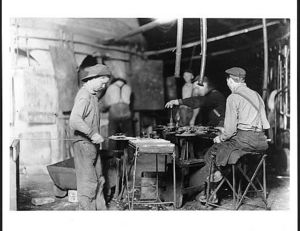Difference between revisions of "Marion Lynching Resources"
| Line 1: | Line 1: | ||
==='''Marion Lynching Resourses'''<br>=== | ==='''Marion Lynching Resourses'''<br>=== | ||
| − | ''Newspapers'' | + | ''Newspapers<br>'' |
| + | |||
| + | "Trouble Yet Haunts Ex-Resident" | ||
| + | “Trouble Yet Haunts Ex Resident” was an article, in August 2, 1992, written by Greg J. Borowski and published in the Marion Chronicle | ||
| + | |||
| + | Tribune. This article goes into detail about how the lynchings of Abram Smith and Thomas Shipp, and near-lynching of himself affected James | ||
| + | |||
| + | Cameron. Cameron can be seen in his Black Holocaust Museum, founded in Milwaukee, Wisconsin in 1988, usually telling stories of various | ||
| + | |||
| + | lynchings that happened to African Americans around America. Although Cameron would spend most, if not all of his day talking about various | ||
| + | |||
| + | lynchings, he abstained from talking about his own, the only time he could be seen talking about his own was when he was in a group, in lecture | ||
| + | |||
| + | situations. Cameron refrains from talking about his own lynching because he says that it was “too emotional” and he often ends up in tears | ||
| + | |||
| + | midway through the discussion. Reading this article will give anyone who wishes to indulge themselves in knowledge about the Marion Lynchings, | ||
| + | |||
| + | insight into Cameron’s feelings about the subject. Knowing that Cameron can’t openly talk about the subject on a consistent basis unless he is | ||
| + | |||
| + | doing this in some type of lecture situations helps the person know that even after 60 years, Cameron is still affected by this pivotal event. | ||
| + | |||
''Interviews'' | ''Interviews'' | ||
Revision as of 03:31, 19 May 2011
Marion Lynching Resourses
Newspapers
"Trouble Yet Haunts Ex-Resident"
“Trouble Yet Haunts Ex Resident” was an article, in August 2, 1992, written by Greg J. Borowski and published in the Marion Chronicle
Tribune. This article goes into detail about how the lynchings of Abram Smith and Thomas Shipp, and near-lynching of himself affected James
Cameron. Cameron can be seen in his Black Holocaust Museum, founded in Milwaukee, Wisconsin in 1988, usually telling stories of various
lynchings that happened to African Americans around America. Although Cameron would spend most, if not all of his day talking about various
lynchings, he abstained from talking about his own, the only time he could be seen talking about his own was when he was in a group, in lecture
situations. Cameron refrains from talking about his own lynching because he says that it was “too emotional” and he often ends up in tears
midway through the discussion. Reading this article will give anyone who wishes to indulge themselves in knowledge about the Marion Lynchings,
insight into Cameron’s feelings about the subject. Knowing that Cameron can’t openly talk about the subject on a consistent basis unless he is
doing this in some type of lecture situations helps the person know that even after 60 years, Cameron is still affected by this pivotal event.
Interviews
Internet
Videos
- redirect stuff
